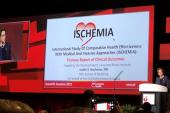Debating ISCHEMIA: Do the Results Apply to CABG, Too?
Two years on, physicians are still debating the trial’s message, including the merits of surgery and complete revascularization.

Two years after the ISCHEMIA trial results were first unveiled, clinicians and trialists are still parsing the findings, the trial design, and the study’s relevance to different patient groups. In a session dedicated to the topic at the recent TCT meeting, a cardiologist and a surgeon went head-to-head over whether the ISCHEMIA trial results would apply to patients eligible for coronary artery bypass graft surgery.
Mario Gaudino, MD, PhD (Weill Cornell Medicine/NewYork-Presbyterian, New York, NY), argued no: CABG surgery, he said, is better than PCI for achieving complete revascularization and this more-invasive strategy appears to reduce the risk of hard clinical events in patients with chronic coronary syndromes.
PCI and CABG surgery are both effective for treating acute or chronic myocardial ischemia, “but the effect in terms of protection against myocardial infarction is different, with surgery being more effective than PCI,” said Gaudino. It may even provide better protection against the risk of death compared with PCI and medical therapy, he said.
Taking the counterpoint position, interventional cardiologist Sripal Bangalore, MD (NYU Langone Medical Center, NY), one of the principal investigators of ISCHEMIA, said that to question whether the results apply to CABG surgery would be a mistake.
“One of arguments that has been made is that ISCHEMIA is a PCI trial,” said Bangalore. However, of the 80% of patients randomized to invasive angiography who underwent revascularization, 530 were treated with surgery, or roughly one in four patients. This is more patients treated with CABG than in BARI-2D, as well as in the historic randomized clinical trials that established the benefit of surgery, such as CASS and the VA Study.
“More patients in ISCHEMIA underwent CABG than in any of the trials of revascularization versus medical therapy and this is one of the reasons why we need to take the results seriously,” said Bangalore.
In the ISCHEMIA trial, which was presented at the American Heart Association Scientific Sessions 2 years ago and published April 2020 in the New England Journal of Medicine, investigators showed that an invasive strategy on top of optimal medical therapy offered no benefit beyond medical therapy alone in preventing a range of major cardiovascular events in 5,179 patients with stable CAD, preserved ejection fraction, and moderate-to-severe ischemia. In the landmark study, the invasive strategy did provide greater symptom relief, but there was no significant reduction in hard clinical events, including mortality, over a median of 3.3 years of follow-up.
‘Biologically Plausible’
Despite the bold stance taken for the sake of the debate, Gaudino acknowledged that ISCHEMIA doesn’t support his argument, stating it is only “biologically plausible” that CABG surgery would be superior to PCI. In patients with stable multivessel CAD, it is atherosclerotic disease burden, not flow-limiting coronary stenoses, that is the main predictor of future cardiovascular disease events, said Gaudino. Stents, he said, only target flow-limiting lesions, while surgery provides greater protection by treating both the coronary stenosis and downstream diseased segments not currently limiting coronary blood flow.
He also pointed to several analyses hinting at the superiority of surgery in chronic coronary syndromes.
For example, a widely cited 2018 meta-analysis in the Lancet by Stuart Head, MD (Erasmus University Medical Center, Rotterdam, the Netherlands), showed that CABG surgery was associated with a lower risk of death at 5 years compared with PCI in patients with multivessel CAD. Gaudino also cited another meta-analysis of patients with stable ischemic heart disease and myocardial ischemia who were treated with different revascularization strategies. In that study, neither PCI nor CABG reduced long-term mortality compared with optimal medical therapy alone, but CABG surgery was associated with a lower risk of spontaneous MI compared with medical therapy; PCI did not influence risk of this outcome.
Finally, Gaudino turned to a previously criticized meta-analysis showing that revascularization of stable CAD reduced the risk of cardiac death and spontaneous MI, and that the reduction was larger in trials of CABG surgery.
All in all, he said, “[this] seems to suggest that the protective effect of surgery in terms of preventing MI and reducing cardiac death is stronger than the effect with PCI,” he said before adding that some of the evidence is based on old trials—some 40 years old—and is not representative of current practice, particularly with respect to medical therapy and PCI.
Arguing his own position, Bangalore seized on this point. Clinical trials have shown that CABG surgery reduces mortality in stable CAD patients, but the evidence is largely from the 1980s, an era when there was extremely limited medical therapy, he said. In the ISCHEMIA trial, there was no interaction with revascularization strategy—neither PCI nor CABG reduced the five-point composite endpoint of cardiovascular death, MI, hospitalization for unstable angina, hospitalization for heart failure, or resuscitation due to cardiac arrest, said Bangalore. In BARI-2D, another contemporary clinical trial, there was also no reduction in the risk of death among the CABG-treated patients.
Bangalore said that one of arguments in favor of surgery is the suggestion that PCI doesn’t reduce the risk of MI, but that is a fallacy. In ISCHEMIA, there was no significant reduction in the overall risk of MI with the invasive strategy, but the event curves crossed around 2 years, and a “nuanced” view of the data, including findings from other studies, suggests that there is likely a benefit to treatment. Moreover, spontaneous MI was reduced in patients treated invasively compared with medical therapy, and this benefit was observed both in those treated with CABG and those who underwent PCI, said Bangalore.
For his part, Gaudino suggested that further follow-up of ISCHEMIA may yet reveal differences between the two strategies, noting that the event curves in the EXCEL trial, a study comparing PCI versus CABG for the treatment of left main CAD, increased in favor of surgery over time.
Complete Revascularization—Better With Surgery?
Following the debate, moderator Gregg Stone, MD (Icahn School of Medicine at Mount Sinai, New York, NY), pointed to an exploratory analysis of ISCHEMIA showing that patients who received “complete” revascularization in the ISCHEMIA trial appeared to derive more clinical benefit with the invasive strategy than with medical therapy over follow-up. However, complete revascularization, which is “traditionally better with surgery than with PCI,” is not always possible in the cath lab.
Margaret McEntegart, MD (Golden Jubilee National Hospital, Glasgow, Scotland), agreed. “If you’re going to take a patient to the cath lab with multivessel disease, then you need to be in it 100% to give that patient the best outcome, especially if the alternative is a bypass operation,” she said.
As an interventional cardiologist specializing in complex procedures, McEntegart said ISCHEMIA tells physicians they have time to wait and see if symptoms progress in stable CAD patients treated with optimal medical therapy. But if the heart team suggests PCI or CABG, then it’s paramount to achieve complete revascularization, she said.
Like Gaudino, Pamela Douglas, MD (Duke University Medical Center, Durham, NC), said that most MIs occur in nonobstructive disease, “presumably related to vulnerable plaque, although we don’t really know that in-depth in a large population—we just have little snippets of information from IVUS trials.” Plaque erosion, as well as significant stenoses causing ischemia, can also lead to MI.
“The benefit of CABG is that you’re revascularizing the whole vessel and you don’t really need to say [as you do with PCI], ‘Do I need to do that lesion? Or that lesion? Or is there diffuse plaque throughout the vessel that I can’t really address?’ CABG kind of does it all,” Douglas said. “We know that plaque burden is incredibly important for prognosis, and the success of CABG reinforces that concept because it bypasses all of the plaque and not just localized plaque.”
Debating All-Cause and CV Mortality
One of the things to consider in ISCHEMIA is how to interpret all-cause versus cardiovascular mortality in clinical trials, Stone observed after the debate wrapped up. In ISCHEMIA, he noted, there was absolutely no sign revascularization with PCI or CABG had an impact on all-cause mortality, but there was a small trend toward fewer cardiovascular deaths with revascularization over longer-term follow-up.
“There’s issues with adjudication,” said Stone, referring to situations where the underlying cause of death isn’t correctly identified as being cardiovascular, “but there is no reason to think that these therapies would affect noncardiovascular mortality.”
David Cohen, MD (St. Francis Hospital and Heart Center, Roslyn, NY), agreed that if revascularization is going to have an impact on patient deaths, it’s likely going to be through a reduction in the risk of cardiovascular mortality. Like Stone, Cohen said adjudication of events can “tricky and somewhat subjective.” If a trial is large enough with long enough follow-up, a therapy that reduces cardiovascular mortality would also likely affect all-cause mortality, he said, noting that most public health guidelines, including screening directives from United States Preventive Services Task Force, focus on preventing cause-specific mortality.
“I think cardiovascular mortality is a fair target as long as the adjudication is, if anything, conservative,” said Cohen.
One of the sources of contention, among others, between surgeons and interventional cardiologists about the EXCEL trial stems from interpreting the significantly increased risk of all-cause mortality with PCI compared with surgery at 5 years. This led to the infamous blowup 2 years ago as surgeons argued the finding was significant while the EXCEL researchers, Stone among them, contended the higher risk of death was driven by noncardiovascular causes.
Michael O’Riordan is the Managing Editor for TCTMD. He completed his undergraduate degrees at Queen’s University in Kingston, ON, and…
Read Full BioSources
Gaudino M. The ISCHEMIA trial results do not apply to CABG: our outcomes are different. Presented at: TCT 2021. Orlando, FL. November 4, 2021.
Bangalore S. The ISCHEMIA results apply to all revascularization: we all need to reconsider our approach. Presented at: TCT 2021. Orlando, FL. November 4, 2021.
Disclosures
- Gaudino reports no relevant conflicts of interest.
- Bangalore reports grant/research support from Abbott Vascular and consulting fees/honoraria/speakers bureau fees from Abbott Vascular and Biotronik.
- Stone reports consulting fees/honoraria/speakers bureau fees from Elucid Bio, HeartFlow, Abiomed, Valfix, TherOx, Gore, Ablative Solutions, Miracor Medical SA, Ancora, Vectorius, Robocath, Neovasc, and Cardiomech; equity/stocks/options in SpectraWave, Orchestra Biomed, Applied Therapeutics, Biostar funds, Aria, Cardiac Success, Valfix, Ancora, and Cagent; and grant/research support from Philips, Vascular Dynamics, V-Wave, Biosense Webster, Abbott Vascular, Bioventrix, and CSI.
- Cohen reports grant/research support from Boston Scientific, Edwards Lifesciences, Medtronic, Abbott Vascular, Volcano Corporation, Svelte, Corvia, and Saranas; consulting fees/honoraria/speakers bureau fees from Medtronic, Abbott Vascular, Boston Scientific, and Edwards Lifesciences; and grant/research support from Ancora.
- McEntegart reports consulting fees/honoraria/speakers bureau fees from Abbott Vascular, Boston Scientific, Shockwave Medical, and Teleflex.
- Douglas reports institutional research/grant support from HeartFlow, caption health, Kowa, Gilead, and ViiV.





Comments